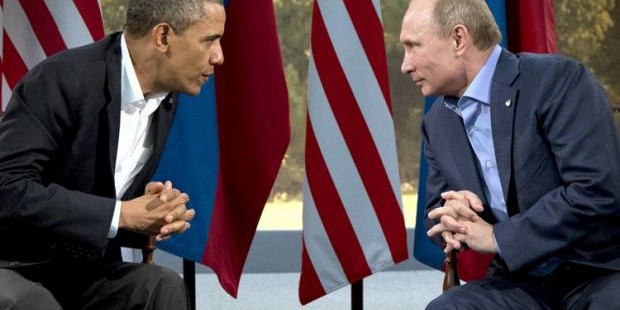
“A steady flow of stupidity”: Reality in Ukraine — and Obama and the New York Times’ bizarro parallel universe
A new cease-fire in Ukraine seems durable — despite best efforts of Washington and the media to provoke conflict
We may or may not have a durable cease-fire in Ukraine, given reports of sporadic shelling and machine-gun fire, by who can tell which side, since hostilities were formally halted last Friday. But, always good for a wager, my money is it will hold.
True, the vicious neo-Nazis at last acknowledged to be pressing much of Kiev’s campaign in the east will be difficult to disarm — assuming, even as we cannot, that President Poroshenko’s government wants to. Recall: After violence-loving fascists led the coup in February, the provisionals gave them three ministries and organized some into the Azov Battalion. National Socialist ideologues still control those ministries.
As to the battalion, with its black ski masks and refashioned swastika, it has been so visible in the east that not even the New York Times, although still committed to maintaining a parallel universe in reporting this crisis, can pretend any longer that the neo-Nazi connection is other than essential to the government’s survival.
But other factors weigh more heavily, in my calculation. First, the cease-fire deal struck in Minsk last week came after months of back-channeling between two oddly sympatique leaders, Chancellor Merkel in Germany and the demonized Vladimir Putin. This is a matter of record (if not the American record).
The European Union and Russia — the first portrayed as Washington’s willing acolyte, the second as an intractable enemy — have shaped this shaky peace. This is the reality, and they want their project to hold, however much Kiev and the Americans cannot resist turning everything they touch into a confrontation.
Second, Poroshenko’s cabinet has been forced to conclude that a victory on the ground is out of the question. Its army is simply not strong enough and — greatly to its credit — is of mixed minds when it is ordered to shoot other Ukrainians because they happen to speak Russian. Azov and the other paramils are plenty loyal to the atavistic cause — one reason Kiev deploys them — but there are not enough of them, either.
Equally, Putin made his position crystal clear a couple of weeks ago, you may have noticed. It was this: “Kiev and Washington are overplaying their hand as I work with the Europeans to get a deal stitched.” This is why the Russian leader was accidentally on purpose overheard telling an EU minister at the time, “I could take Kiev in two weeks.”
It seems to have gone this way. As the army and the Falangists advanced on anti-Kiev strongholds in Donetsk and Luhansk, it had begun deploying weapons from one NATO nation — news that floored the NATO summit in Wales when Poroshenko delivered it last week. He did not name the country, but it is likely to be either the U.S. or Poland, and the weapons would almost certainly be American in any case.
There had been speculation in Germany and elsewhere in Europe as to why the tide had suddenly turned in Kiev’s favor in the eastern campaign. In effect, Poroshenko gave the game away, and Putin’s response was, roughly, You’ve called my bluff and lost, my dear Poroshenko. We’ll avoid the East-West cataclysm you spoil for, but you and your militarist friends in Washington have taken this charade as far as I’m willing to accept.
Put all this together and maybe you will bet with me: It is not certain the cessation of hostilities will hold, but the odds are attractive.
Not too soon to take a little stock, then.
Looking back on the winding road that led to the Minsk negotiation, we can see a few things clearly. The U.S. has been a force for nothing good in this crisis. It overrode the EU when the latter endorsed a decent political deal between the Yanukovich government and the Independence Square demonstrators last February. This was the famous “‘F’ the EU” moment, you will recall, and the State Department indeed F’d it, instantly endorsing the coup.
Ever since, Washington has refused to countenance any thought of cooperation with Moscow. Confrontation, even to the point of recklessness, was the preferred strategy. Casting Putin as Beelzebub was key in this. You cannot deal with devils.
Here I will say directly what I have hinted many times in this space. Putin’s record on other matters is beside the point; if you bought into these past months of juvenile ad hominem smear, you had better study up on the powers of propaganda and psychological manipulation and think of yourself as a victim.

